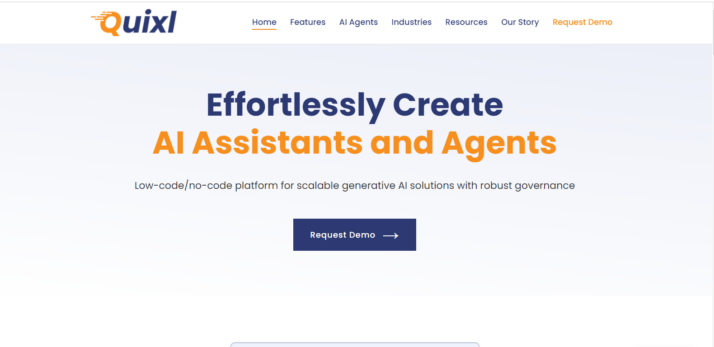Quixl AI vs. MetaGPT: Comparing AI Development Platforms
AI platforms reshape business operations, but choosing the right solution can be daunting. This review compares Quixl AI vs. MetaGPT, and SmythOS, evaluating their strengths in agent development, collaboration, and deployment. We explore user-friendly interfaces, multi-agent capabilities, and integration options to help developers, business leaders, and AI enthusiasts make informed decisions. Whether you seek no-code simplicity, advanced software development tools, or a versatile AI ecosystem, this comparison illuminates each platform’s unique offerings and potential impact on your AI journey.
Quixl AI Overview
Quixl AI, developed by Integra, delivers a comprehensive platform for creating and deploying AI agents across industries. The platform’s no-code AI agent builder leverages generative AI and large language models to streamline automation and boost productivity. Quixl’s curated AI Agents Hub offers pre-built agents for quick deployment in areas like alt-text generation, manuscript assessment, and content editing.


Quixl AI stands out for its seamless AI integration, rapid deployment, and scalable growth capabilities. The platform caters to diverse business needs, from enhancing user engagement in media and entertainment to personalizing learning experiences in education technology. Quixl’s versatility extends to healthcare, where it automates administrative tasks and improves patient care processes.
Quixl AI, developed by Integra, delivers a comprehensive platform for creating and deploying AI agents across industries. The platform’s no-code AI agent builder leverages generative AI…to streamline automation and boost productivity.
The platform’s visual no-code builder empowers users to create sophisticated AI agents without programming expertise. This democratization of AI development allows businesses of all sizes to harness advanced technologies for improved efficiency and innovation. Quixl’s support for both development and production environments facilitates the entire lifecycle of AI application creation and deployment.
Quixl prioritizes security and compliance, offering robust data encryption and OAuth authentication. The platform’s scalability accommodates growth from small projects to large enterprise applications. While Quixl provides a powerful suite of tools, users should consider their specific integration needs and evaluate the learning curve associated with maximizing the platform’s capabilities.
As AI technologies continue to evolve, Quixl AI positions itself as a forward-thinking solution. The platform’s commitment to explainable AI and ethical use aligns with growing industry demands for transparency and responsible AI development. For businesses looking to leverage AI’s potential while maintaining control over their technological ecosystem, Quixl AI offers a compelling blend of accessibility and advanced functionality.
MetaGPT Overview
MetaGPT revolutionizes multi-agent collaboration by combining human Standardized Operating Procedures (SOPs) with advanced Large Language Models (LLMs). Developed by researchers from prestigious institutions, MetaGPT simulates a software company’s structure to enhance AI-driven software development.


MetaGPT assigns distinct roles to AI agents, mirroring a traditional software company’s team structure. This approach enables efficient collaboration on complex tasks, particularly in software engineering. By encoding human workflows into prompt sequences, MetaGPT improves the consistency and reliability of agent outputs.
MetaGPT revolutionizes multi-agent collaboration by combining human Standardized Operating Procedures (SOPs) with advanced Large Language Models (LLMs).
The platform’s core philosophy, “Code = SOP(Team),” integrates established human practices into AI processes. This method significantly reduces errors typically associated with multi-agent systems, such as cascading hallucinations or logic inconsistencies. MetaGPT breaks down tasks into manageable subtasks, ensuring each specialized agent contributes its expertise to the overall project.
MetaGPT generates comprehensive documentation throughout the development process, including requirement documents, design artifacts, flowcharts, and interface specifications. These intermediate outputs enhance the success rate of the final code and facilitate better human-AI interaction. However, the platform’s complexity may present a steep learning curve for new users, and its focus on software development might limit its applicability in other domains.
By leveraging human-like SOPs and structured communication protocols, MetaGPT aims to establish a new standard in AI and multi-agent collaboration. This framework expands the capabilities of AI agents, enabling them to tackle more complex and diverse tasks across various domains. As the field of AI continues to evolve, MetaGPT’s approach to mimicking human collaboration processes within an AI framework positions it as a unique and powerful tool for developers and organizations seeking to harness the full potential of multi-agent AI systems.
Feature Comparison
Quixl AI and MetaGPT offer distinct approaches to AI agent development, each with unique strengths and limitations. Quixl AI provides a comprehensive no-code platform for creating and deploying AI agents across various industries, while MetaGPT focuses on simulating a software company structure for collaborative AI-driven software development.
Quixl AI excels in its user-friendly interface, offering a visual no-code AI agent builder that simplifies agent creation for users without programming expertise. It supports both development and production environments, facilitating the entire lifecycle of AI application development. Quixl AI also provides robust security features, including data encryption and OAuth authentication, making it suitable for enterprise-level deployments.
In contrast, MetaGPT’s strength lies in its innovative approach to multi-agent collaboration. By assigning distinct roles to AI agents and utilizing human-like Standardized Operating Procedures (SOPs), MetaGPT aims to enhance the consistency and reliability of agent outputs, particularly in software engineering tasks. However, MetaGPT may present a steeper learning curve for new users due to its complex structure and focus on software development.
While both platforms support multi-agent collaboration, Quixl AI offers a broader range of pre-built AI agents and integration options, including Zapier APIs and various third-party services. MetaGPT, on the other hand, emphasizes the generation of comprehensive documentation throughout the development process, which may be particularly valuable for software projects requiring detailed specifications and design artifacts.
Feature Comparison Table
| Quixl AI | MetaGPT | SmythOS | |
|---|---|---|---|
| CORE FEATURES | |||
| Visual Builder | ✅ | ❌ | ✅ |
| No-Code Options | ✅ | ❌ | ✅ |
| SECURITY | |||
| IP Control | ✅ | ❌ | ✅ |
| COMPONENTS | |||
| Data Lakes | ✅ | ❌ | ✅ |
| DEPLOYMENT OPTIONS (EMBODIMENTS) | |||
| Staging Domains | ✅ | ❌ | ✅ |
| DATA LAKE SUPPORT | |||
| Hosted Vector Database | ✅ | ❌ | ✅ |
| Sitemap Crawler | ❌ | ❌ | ✅ |
| YouTube Transcript Crawler | ❌ | ❌ | ✅ |
| URL Crawler | ❌ | ✅ | ✅ |
Best Alternative to Quixl AI and MetaGPT
SmythOS stands out as the superior alternative to Quixl AI and MetaGPT, offering a comprehensive platform for AI agent development and deployment. We combine powerful features with unparalleled ease of use, making advanced AI capabilities accessible to users of all skill levels.
Our drag-and-drop visual builder sets SmythOS apart from competitors. Users can create complex AI workflows without extensive coding knowledge, democratizing AI development across industries. This intuitive interface, coupled with our extensive library of pre-built components and integrations, allows for rapid prototyping and deployment of AI solutions.
SmythOS stands out as the superior alternative to Quixl AI and MetaGPT, offering a comprehensive platform for AI agent development and deployment.
SmythOS excels in its versatility and scalability. We support a wide range of AI models from various providers, including OpenAI, Anthropic, and Hugging Face. This flexibility ensures that users can leverage the most suitable AI technologies for their specific needs. Our platform seamlessly integrates with numerous APIs and services, enabling AI agents to interact with existing business systems and processes effortlessly.
Unlike Quixl AI and MetaGPT, SmythOS offers a comprehensive suite of deployment options. We empower users to deploy their AI agents as APIs, webhooks, scheduled tasks, or even as chatbots embedded directly on websites. This versatility allows for seamless integration of AI capabilities into diverse business environments, from startups to enterprise-level operations.
Security and scalability are paramount in SmythOS. We provide robust data encryption, OAuth authentication, and IP control features, ensuring that AI deployments meet stringent security requirements. Our platform’s ability to handle large-scale operations makes it ideal for businesses looking to grow their AI capabilities alongside their operations.
Conclusion
Quixl AI and MetaGPT offer compelling solutions for AI agent development, each with distinct strengths. Quixl AI provides a user-friendly, no-code platform for rapid AI deployment across industries, while MetaGPT excels in simulating software company structures for collaborative AI-driven development.
However, SmythOS emerges as the superior choice, combining the best of both worlds and offering unparalleled versatility. Our platform’s intuitive drag-and-drop interface rivals Quixl AI’s ease of use, while our support for multi-agent collaboration matches MetaGPT’s advanced capabilities. SmythOS goes further by offering extensive integration options, including over 300,000 pre-built API connections, surpassing both competitors in flexibility and scalability.
Unlike Quixl AI and MetaGPT, SmythOS provides a true “create once, deploy anywhere” experience. We enable users to build AI agents that seamlessly integrate into multiple environments, from chatbots and APIs to scheduled tasks and GPT plugins. This versatility, combined with our robust security features and support for various AI models, positions SmythOS as the ideal choice for businesses seeking a comprehensive, future-proof AI development platform.
To experience the power and flexibility of SmythOS firsthand, we invite you to create a free SmythOS account. Start building AI agents today with our risk-free trial, offering unlimited agent creation and a 30-day money-back guarantee. Unlock the potential of AI for your business and join the AI revolution with SmythOS.
Last updated:
Disclaimer: The information presented in this article is for general informational purposes only and is provided as is. While we strive to keep the content up-to-date and accurate, we make no representations or warranties of any kind, express or implied, about the completeness, accuracy, reliability, suitability, or availability of the information contained in this article.
Any reliance you place on such information is strictly at your own risk. We reserve the right to make additions, deletions, or modifications to the contents of this article at any time without prior notice.
In no event will we be liable for any loss or damage including without limitation, indirect or consequential loss or damage, or any loss or damage whatsoever arising from loss of data, profits, or any other loss not specified herein arising out of, or in connection with, the use of this article.
Despite our best efforts, this article may contain oversights, errors, or omissions. If you notice any inaccuracies or have concerns about the content, please report them through our content feedback form. Your input helps us maintain the quality and reliability of our information.
